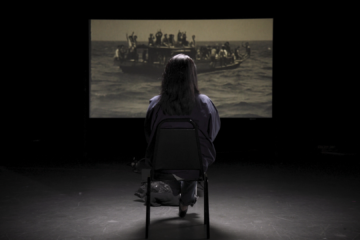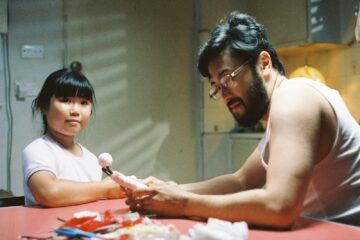Set in Berlin, Jackfruit details the story about Mít, a gender fluid person, in search of the connection between Mít’s two cultural identities believed to be incompatible. Director Thùy Trang Nguyễn, discusses the film’s inspiration, how their personal bond with their grandmother ties to the heart of the film, and the queer identity in relation to Vietnamese culture.
Jackfruit is the second film of a trilogy about the Vietnamese diaspora in Germany. What inspired you to create a film about this topic, with a focus on the relationship between a grandmother/mother/daughter?
My grandmother and I had a very close bond. I grew up with her, since my parents had to work very long shifts. She didn’t speak German, so we communicated in Vietnamese. We shared our experiences and shifted our perspectives: she told me of things that reminded her of Vietnam and I taught her German through children’s books. When I started filmmaking, I knew I had to tell her story.
I started writing the script for Roan (the first film of that trilogy), a short documentary, from the perspective of a German grandchild. I asked her about her childhood and her life during the war. It did not feel right, though. She would never go into details, she would change subjects really quickly and she’d happily point out that she was at Disneyland – and not in a bunker. This felt so crucial to me. What needed to be preserved was not the memory of war, but the memory of resilience. Even if her past was painful, it was her softness that touched me the most. So in Roan I turned a painful and complex feeling into a glimpse of an afternoon with my grandmother. And I turned Jackfruit into the fictional continuation of that afternoon.
[I wanted to put] it into a bigger perspective, incorporating three different generations and posing the question of what will happen if the generation of my grandmother fades away. What will be left of me? Not only to keep her in memory but to shape my own (hi)story.
As you have described, this film is about three generations of strong women and non-binary people. With these characters, how can we understand “queerness” in a broader way, perhaps not only in relation to sexuality?
Queerness was always a part of our culture. I’ve learned through a friend that Quan Âm is a holy figure with two or no gender. My grandmother used to pray to Quan Âm. Many of my peers and I wish that we would have known earlier. Many people in our generation perceive tradition and modern life as a painful contradiction, I wanted Jackfruit to be part of the generational healing process. I wrote a non-binary, queer main character whose motivation is not to come-out but to be the keeper of the family altar. Our authentic reality is very complex. Just like Quan Âm you can be everything, even though it feels like a contradiction.
The story is set in Berlin, which embodies a history of partition without a civil war. It’s also home to many Vietnamese people since the Vietnam War. How do you think this particular city has created a unique experience or representation of Vietnamese people, both in real life and in your film?
In Jackfruit, I decided to focus on the Vietnamese diasporic lives as single islands, instead of being connected to Berlin and its history. Mai Phuong Kollath, Hồng Ngọc Lê and Dần Boldt played brought so much more depth to the characters, because they weren’t afraid to work with their own experiences.
I also had the opportunity to document the Têt festivities in Berlin, while improvising with Lê. All of the bits with Boldt were improvised as well. Those scenes gave the movie a very real-life documentary feel which I really like since authenticity was the style I was going for. The main goal was to find out how to represent, instead of only being represented.
It challenged all of us to find new visual ways to capture those complex experiences and feelings of identity or familiar belonging in the diaspora. But at the same time, I am very aware that this story and these amplified voices are only one part of the bigger network. I don’t think there is one unique experience or representation, rather many that mirror, connect or differentiate each other.
(Interviewed by Jiyon Byun)
####
Jackfruit will be shown at Viet Film Fest 2023 as part of the “Spectrum of Stories” short film set. It will be screened at 10 AM on Saturday, October 7 at the Frida Cinema in Santa Ana, California. It can also be seen virtually.
About Thùy Trang Nguyễn
Thuy Trang Nguyen was born to Vietnamese parents in Berlin, Germany in 1993. After graduating high school they became Co-founder of the non-profit organization BERLIN ASIAN FILM NETWORK. Before attending filmschool in 2017 at internationale filmschule köln, they took a theoretical approach to audiovisual arts and studied film theory at Freie Universität Berlin. They worked as assistant director, sound engineer and editor for fictional and non-fictional features, gaining work experiences in England, Germany and Vietnam. Aiming to raise awareness of under- and misrepresentation of the Asian Diaspora in the German media, they started to work as a Dialogue Coach and Caster/ Streetcaster for actors and actresses of Asian descent. As a director at internationale filmschule köln, their films revolve around family and identity, queerness and crossing borders. ROAN is the first part of a trilogy about the Vietnamese Diaspora in Germany. JACKFRUIT continues the deconstruction of the colonial gaze.
VIET FILM FEST 2023
September 30th to October 15th, 2023
Program Schedule and Tickets:
https://vff2023.eventive.org/welcome
Follow @vietfilmfest on Facebook, Instagram, and YouTube



0 Comments